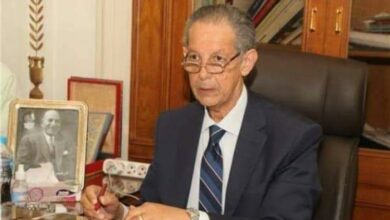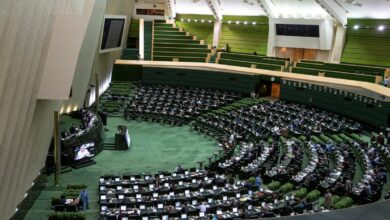Two issues have brought the name of Egypt’s top judge Hossam al-Gheriany to the forefront recently: a crisis surrounding the independence of the judiciary, demonstrated in several recent cases, and calls from the Muslim Brotherhood and Salafis for him to run for president.
The two issues are not totally unrelated. The man who fiercely fought with Hosni Mubarak’s regime over the independence of the judiciary is widely viewed today as a figure of consensus who could potentially be his successor. Today, Gheriany holds the country’s most prestigious judicial post, the head of the Supreme Judiciary Council and Court of Cassation, and is one of Egypt’s few public figures widely respected by all political forces.
But now that talk about his presidential candidacy is fading out, Gheriany’s relevance persists as a staunch advocate for the independence of the judiciary at a time when concerns are rising about the critically compromised branch of the state.
One recent example was in February. After some MPs of the Islamist dominated parliament called for the removal of General Prosecutor Abdel Meguid Mahmoud, deemed to be one of the Mubarak-era figures, Gheriany criticized the lawmakers saying that parliament shouldn’t intervene in the judiciary.
Mahmoud, 66, was appointed as Egypt’s top prosecutor in 2006. He has been widely accused of having a soft approach in combating corruption. Also, many accused him of being a tool of the ruling regime both under Mubarak and now, under the military council.
But Gheriany’s criticism was not understood as a defense for Mahmoud.
“We all know the shortcomings of Abdel Meguid (Mahmoud), but keeping him is less dangerous than removing him. Sacking him will lead to disastrous consequences. You simply legitimize interference in the judiciary,” a judge, who belongs to the independent judiciary movement and who asked not to be identified, told Egypt Independent.
Gheriany’s battle for the independence of the judiciary goes further back.
Born in the Nile Delta governorate of Sharqiya in 1941, he obtained a BA in law from the University of Alexandria in 1962. Shortly after his graduation, he joined the public prosecutor’s office in which he spent 12 years, before becoming a judge in 1974.
Like several figures leading the independence of the judiciary current today, Gheriany witnessed what’s known in Egypt’s history as the “Massacre of Judges.” In 1969, the regime of late President Gamal Abdel Nasser plotted to exercise a complete dominance on the judiciary. But Judge Momtaz Nassar along with other judges stood against this plan. Nasser fired back by sacking scores of judges and prosecutors in an incident recognized as one of the worst in Egypt’s judicial history.
“Four decades now after the Massacre of Judges, Gheriany and other figures of the independence of the judiciary movement have resisted any interference of the regime in judicial affairs,” says Nabil Abdel Fattah, a political analyst with Al-Ahram Center for Political and Strategic Studies.
Gheriany moved on to acquire academic and professional experience that deepened his understanding of the independence of the judiciary.
Since the wave of the massacre lapsed, he advanced in his post graduate studies obtaining two diplomas, one in public law and the second in criminal law, in which he specializes. In 1975, he was sent to Libya as a judge for two years. He was also dispatched to the United Arab Emirates to work as a judge there. He was appointed late the deputy head of the National Center for Judicial Studies (CNEJ). In 1986, he became a chancellor in the Court of Cassation. He also attended l’Ecole Nationale de la Magistrature, a prestigious school that gives training for judges. This experience gave him insight in comparative legal systems along with some sharp knowledge about how an independent judiciary should operate.
“He is most probably the best person to know about the question of the independence of the judiciary in Egypt,” argues Karim El Chazli, a legal researcher based in France.
Armed with these experiences, Gheriany kicked off his battle during the Mubarak era. At the time, the notorious judicial system was not restrained to the judicial branch alone, but transcended judges and courts. Indeed, many believe Mubarak’s misuse of the judiciary to be one of the first nails in his coffin, predating the revolution proper.
In 1986, Gheriany was one of three judges who organized a major conference calling for the independence of the judiciary, alongside the influential judge Yahya al-Refai, who was removed by Nasser in the 1969 Massacre of Judges and Ahmed Mekky, another distinguished judge. Mubarak attended the conference.
In 2005, Gheriany wrote a report detailing various illegal interventions perpetrated by the government in amending a provision of the 1971 constitution. The amendment changed the way the president is elected.
Since 1956, Egyptians approved or rejected a presidential candidate in a referendum administered by Parliament. Allies of the regime nearly always dominated the referendum. It was hence easy for Mubarak to win four referendums giving him 24 years in office.
Bowing to American pressure, Mubarak designed multi-candidate presidential elections through constitutional changes that were approved in May 2005 in a public referendum.
Gheriany continued to confront Mubarak, starting a new battle over the rigging of the referendum results. Some voices in the judiciary called for judges to boycott supervising the parliamentary elections.
Analysts at that time portrayed the scene as a fiery one. “The boycott threat could not have come at a worse time for the government. Not only was it facing an upsurge in domestic opposition, but it was falling under increasing international criticism for its autocratic nature,” reads a report by the US-based Carnegie Endowment.
Months later, many Egyptian judges, inspired by Gheriany, said that the parliamentary elections that year were also rigged in favor of Mubarak’s ruling National Democratic Party.
From that moment, Egypt witnessed an unprecedented battle from the judiciary against the regime calling for political reforms.
Not only did the regime ignore the angry concerns of the judges, it also tried to punish them by referring two notable judges, Mahmoud Mekki and Hisham Bastawisi, to a disciplinary board on account of “their outspoken criticism of the irregularities that marred parliamentary elections.”
An Amenesty International report condemned the action.
Now retired, Mekki recalled how Gheriany told judges that he would hold a protest in the street to reject the regime’s move.
“He was the one who mobilized judges against that unfair decision by the former regime,” Mekki told Egypt Independent. “He said that he will stand in the streets even alone to protest this decision.”
Mubarak later tried to further curb the wave of opposition by cancelling full judicial supervision of the electoral process. He did this through a new set of constitutional amendments approved in a vote in 2007, which were again believed to be widely rigged.
Through such amendments, Mubarak made it easy to guarantee that no one from the opposition could make it to parliament. In 2010, elections were conducted with the NDP dominating the whole parliament, expect for a few seats. The poll was described as the most fraudulent elections in Egyptian history.
Today, many consider the upsurge in the judges’ anger in 2005 and the events that followed as one of the main elements that helped topple Mubarak six years later.
As all this was happening, Gheriany became increasingly targeted by the regime.
In 2008, rumors spread that Mubarak was going to amend the judicial authority law to extend the retirement age for judges to 72. Such move was perceived as a tool to prevent Gheriany from becoming the head of the Court of Cassation in 2011, as he would have been the most senior and eligible judge for the post.
Amid criticism from judges, Mubarak didn’t go further with extending the retirement age and Gheriany was nominated as head of the Supreme Judiciary Council and Court of Cassation last July, six months after the fall of the president.
Today, Gheriany continues his fight for the independence of the judiciary during a precarious time of new political configurations, but his history of confrontation with Mubarak has left him with a powerful legacy.
And some political powers say that legacy could win him the presidency. Recent talk about the possibility of his presidential candidacy is reminiscent of the few judges who have also been political leaders in Egypt’s modern history.
One example is Yahya Ibrahim Pasha, a former judge and who later served as prime minister between 1923 and 1924. Ismail Sidqi Pasha was prime minister of Egypt between 1930 and 1933; and again in 1946. He also worked in the public prosecutor's office.
In the current presidential race, two candidates have a relation with the judiciary; Hesham al-Bastawisi, vice president of the Court of Cassation. Bastawisi was sent back in 2005 to a disciplinary board by the Mubarak regime. Another is former judge and controversial political figure Mortada Mansour. Neither are frontrunners.
But talk about Gheriany’s presidential candidacy could hurt his reputation as man of the judiciary, widely known for his non-partisan nature and respected by all political forces.
In post-Mubarak Egypt, where the political landscape has witnessed a heated rivalry between those criticizing the interim military rulers and those defending them, Gheriany has managed to distance himself from both camps.
To the Islamists, he’s a pious man. For the seculars, he is a staunch admirer of the French legal system. And revolutionary forces hail him for being one of the leading figures in Egypt’s long battle for the independence of the judiciary.
But calls from the Islamist camp asking him to run for the presidency have raised questions about his partisanship.
“He is undoubtedly more open-minded and tolerant and less conservative than the Muslim Brotherhood and Salafis,” argued Chazli. “He might be a consensual candidate if his candidacy was not promoted by them. Being supported by them might tarnish his image among those who do not know his glorious past as a promoter of judicial independence during Mubarak’s reign.”
But now that talks on the matter have taken a back seat, Gheriany remains a voice of consensus, a mantle he’s not likely to lose.
“When he speaks, everyone listens,” Abdel Fattah purports.




